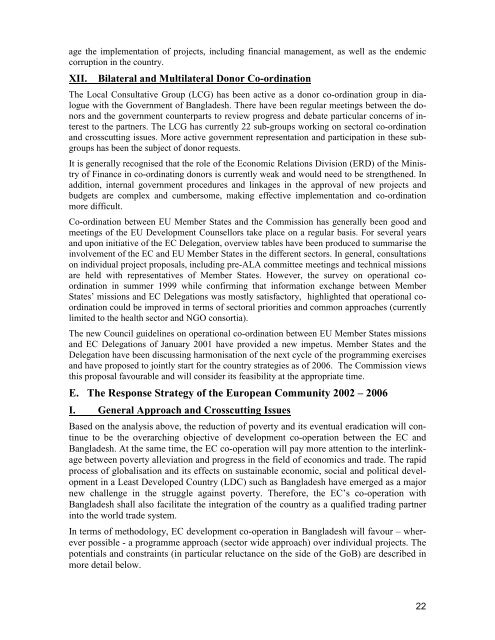EC Country Strategy Paper for Bangladesh 2002-2006
EC Country Strategy Paper for Bangladesh 2002-2006
EC Country Strategy Paper for Bangladesh 2002-2006
Create successful ePaper yourself
Turn your PDF publications into a flip-book with our unique Google optimized e-Paper software.
age the implementation of projects, including financial management, as well as the endemic<br />
corruption in the country.<br />
XII. Bilateral and Multilateral Donor Co-ordination<br />
The Local Consultative Group (LCG) has been active as a donor co-ordination group in dialogue<br />
with the Government of <strong>Bangladesh</strong>. There have been regular meetings between the donors<br />
and the government counterparts to review progress and debate particular concerns of interest<br />
to the partners. The LCG has currently 22 sub-groups working on sectoral co-ordination<br />
and crosscutting issues. More active government representation and participation in these subgroups<br />
has been the subject of donor requests.<br />
It is generally recognised that the role of the Economic Relations Division (ERD) of the Ministry<br />
of Finance in co-ordinating donors is currently weak and would need to be strengthened. In<br />
addition, internal government procedures and linkages in the approval of new projects and<br />
budgets are complex and cumbersome, making effective implementation and co-ordination<br />
more difficult.<br />
Co-ordination between EU Member States and the Commission has generally been good and<br />
meetings of the EU Development Counsellors take place on a regular basis. For several years<br />
and upon initiative of the <strong>EC</strong> Delegation, overview tables have been produced to summarise the<br />
involvement of the <strong>EC</strong> and EU Member States in the different sectors. In general, consultations<br />
on individual project proposals, including pre-ALA committee meetings and technical missions<br />
are held with representatives of Member States. However, the survey on operational coordination<br />
in summer 1999 while confirming that in<strong>for</strong>mation exchange between Member<br />
States’ missions and <strong>EC</strong> Delegations was mostly satisfactory, highlighted that operational coordination<br />
could be improved in terms of sectoral priorities and common approaches (currently<br />
limited to the health sector and NGO consortia).<br />
The new Council guidelines on operational co-ordination between EU Member States missions<br />
and <strong>EC</strong> Delegations of January 2001 have provided a new impetus. Member States and the<br />
Delegation have been discussing harmonisation of the next cycle of the programming exercises<br />
and have proposed to jointly start <strong>for</strong> the country strategies as of <strong>2006</strong>. The Commission views<br />
this proposal favourable and will consider its feasibility at the appropriate time.<br />
E. The Response <strong>Strategy</strong> of the European Community <strong>2002</strong> – <strong>2006</strong><br />
I. General Approach and Crosscutting Issues<br />
Based on the analysis above, the reduction of poverty and its eventual eradication will continue<br />
to be the overarching objective of development co-operation between the <strong>EC</strong> and<br />
<strong>Bangladesh</strong>. At the same time, the <strong>EC</strong> co-operation will pay more attention to the interlinkage<br />
between poverty alleviation and progress in the field of economics and trade. The rapid<br />
process of globalisation and its effects on sustainable economic, social and political development<br />
in a Least Developed <strong>Country</strong> (LDC) such as <strong>Bangladesh</strong> have emerged as a major<br />
new challenge in the struggle against poverty. There<strong>for</strong>e, the <strong>EC</strong>’s co-operation with<br />
<strong>Bangladesh</strong> shall also facilitate the integration of the country as a qualified trading partner<br />
into the world trade system.<br />
In terms of methodology, <strong>EC</strong> development co-operation in <strong>Bangladesh</strong> will favour – wherever<br />
possible - a programme approach (sector wide approach) over individual projects. The<br />
potentials and constraints (in particular reluctance on the side of the GoB) are described in<br />
more detail below.<br />
22

















